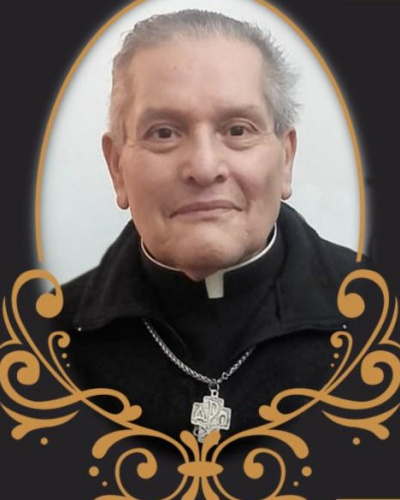
Rev. Roberto González
Biography
Roberto Oscar González was born on November 29, 1945 in Rosario, a city in central Argentina. While growing up, he was religiously formed in the Methodist Church and felt a call to be a pastor. In his youth he became active in the Salvation Army and rose to the rank of captain. In the 1970s he boldly worked with the Argentine Commission for Refugees and Migrants to support persons fleeing the dictatorships in Chile and Uruguay in gaining asylum in the still democratic Argentina in the 1970s.
During this period Roberto struggled with his same-sex desires. He prayed to be “cured” of homosexuality and took testosterone treatments in an effort to become heterosexual. He married a woman and had two children, María Isabel and Francisco.
However, his attraction to men did not subside so he divorced his wife. While in the midst of confusion over his sexuality a pastor friend introduced him to the Fraternidad del Discípulo Amado (Fraternity of the Beloved Disciple), the forerunner of LGBTQ religious groups in Argentina.
González enrolled in seminary at the prestigious ISEDET (Evangelical Institute of Higher Theological Studies), based in Buenos Aires. There he became a strong voice in opposition to exclusion and discrimination and espousing affirmation of LGBTQ persons. Marcella Althaus-Reid, who later became an acclaimed queer theologian, was also studying at ISEDET during this time. She and González developed a strong connection that lasted for years to come. They became part of an informal network of Latin American theologians who called themselves “La Virtual QTL,” the Virtual Queer Liberation Theology Group. González was a controversial figure at ISEDET because of his unorthodox theological positions and his rather flamboyant appearance. When he came out as gay, ISEDET officials told him they would allow him to complete his studies although he would not get a position as pastor.
Therefore, when he completed his seminary degree in 1987, he founded his own church with an LGBTQ outreach, the Metropolitan Community Church of Argentina, Iglesias de la Comunidad Metropolitana (ICM) in Buenos Aires. González had learned about Metropolitan Community Church (MCC) from John Doner, pastor of the MCC in Mexico City, whom he met during Doner’s travels around South America. ICM, which initially met in a bar, was MCC’s first church in South America.
Around this time González he met the man who would become the love of his life--Norberto D’Amico. D’Amico considered himself an atheist at that time. Their relationship developed quickly and they began living together. D’Amico soon had a conversion experience that led to decades of joint ministry and activism with González. Between 1995 and 1997, González and D'Amico, continued their theological training at the Metropolitan Community Church in New York City. They became active leaders in ministry in MCC New York and the MCC denomination. González celebrated the wedding of 12 LGBTQ couples at the 1995 International Lesbian and Gay Association (ILGA) World Conference in Rio de Janeiro, Brazil.
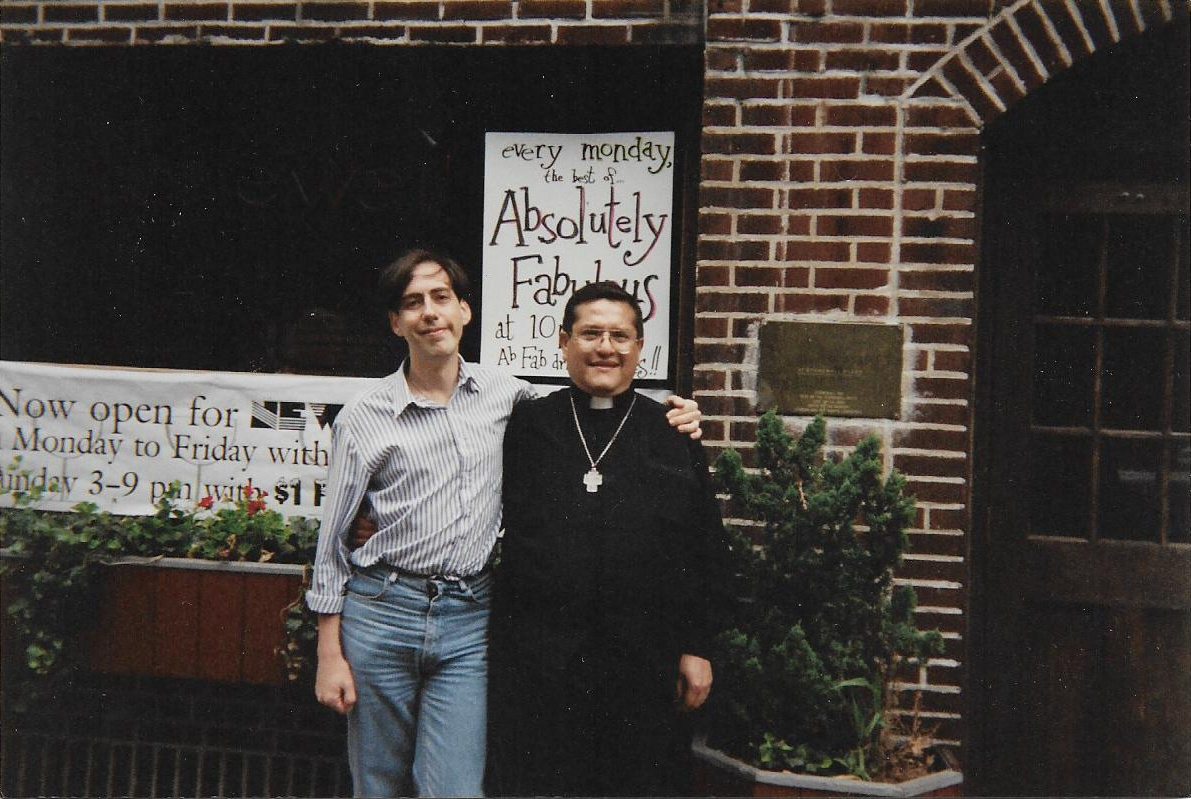 Roberto & Norberto in New York City 1995
Roberto & Norberto in New York City 1995
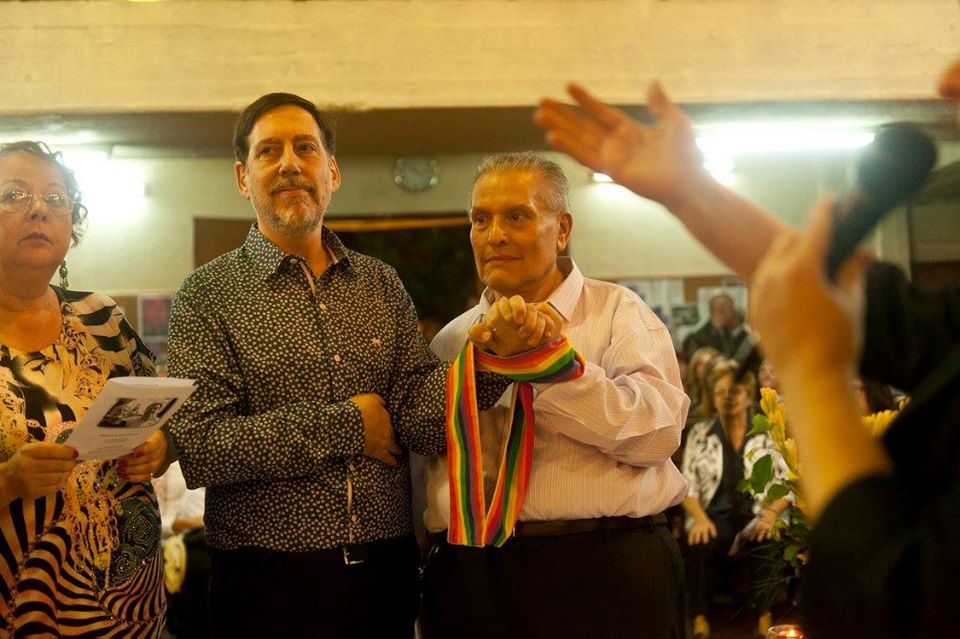 Roberto & Norberto's wedding 2016
Roberto & Norberto's wedding 2016
González courageously became a public spokesperson and visible face for the burgeoning LGBTQ+ rights movement in Argentina. He marched at the front of the first gay pride march in Argentina on July 2, 1992, wearing a clerical collar and large cross. A fervent advocate for trans rights, he was a frequent guest on television shows along with other gay and lesbian activists and became known for his sharp and acidic sense of humor. Much of his activism focused on confronting the Roman Catholic Church for its support of anti-LGBTQ policies and practices. In one dramatic public protest, González chained himself to the gates outside the Vatican Embassy in Buenos Aires. Through his tireless protests and alliances with other human rights organizations, González brought about great strides in ending violence and discrimination based on gender diversity and support for equal marriage in Argentina.
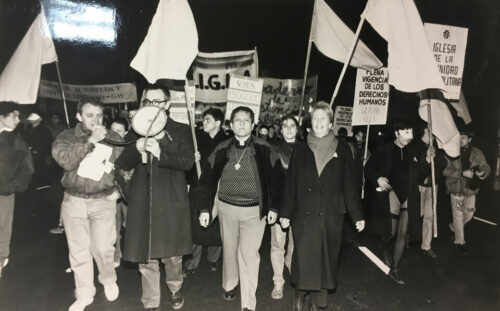 Gonzaléz leading first Pride March in Buenos Aires in 1992
Gonzaléz leading first Pride March in Buenos Aires in 1992
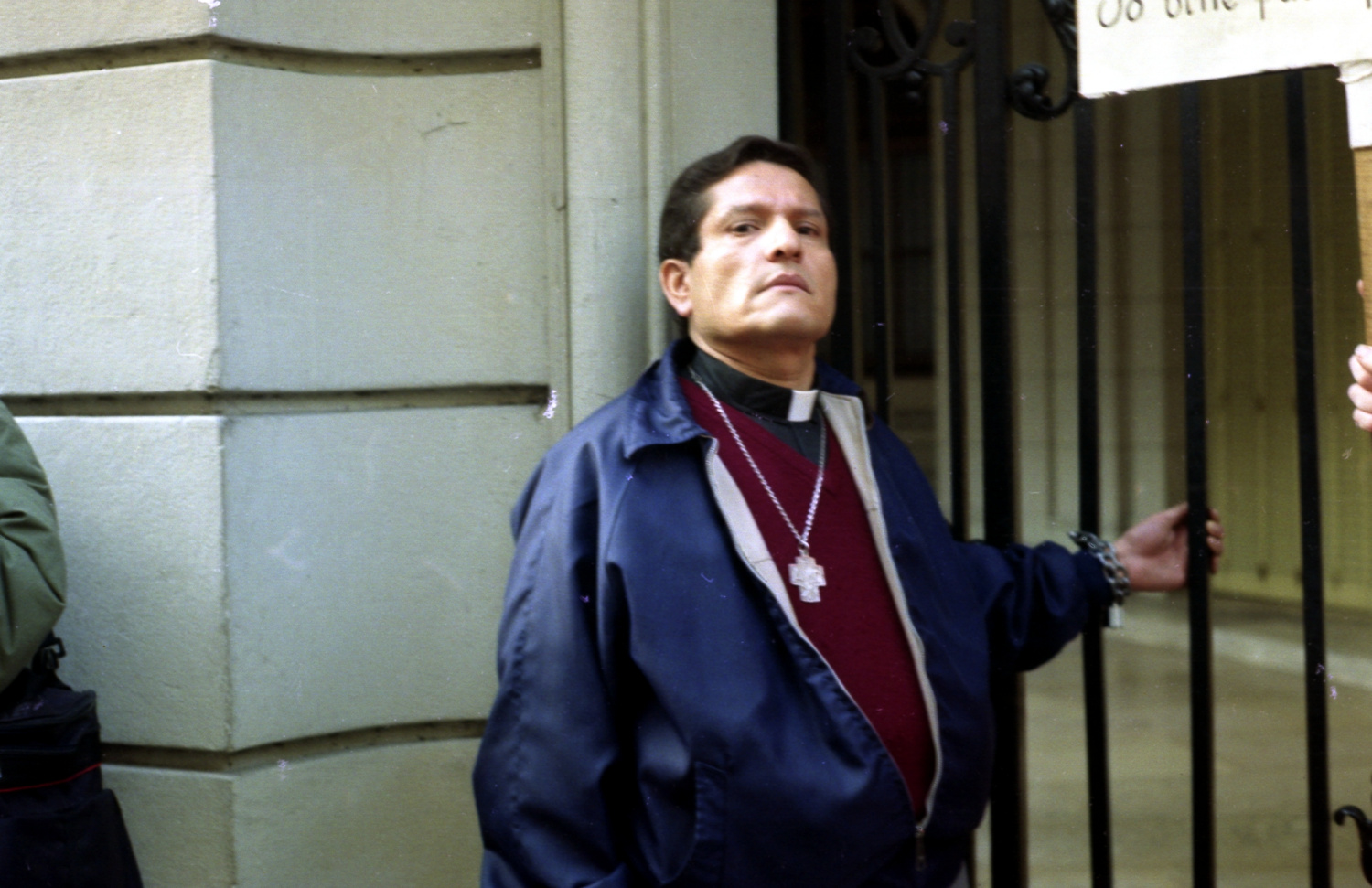 August 1992 protest outside Vatican Embassy in Buenos Aires
August 1992 protest outside Vatican Embassy in Buenos Aires
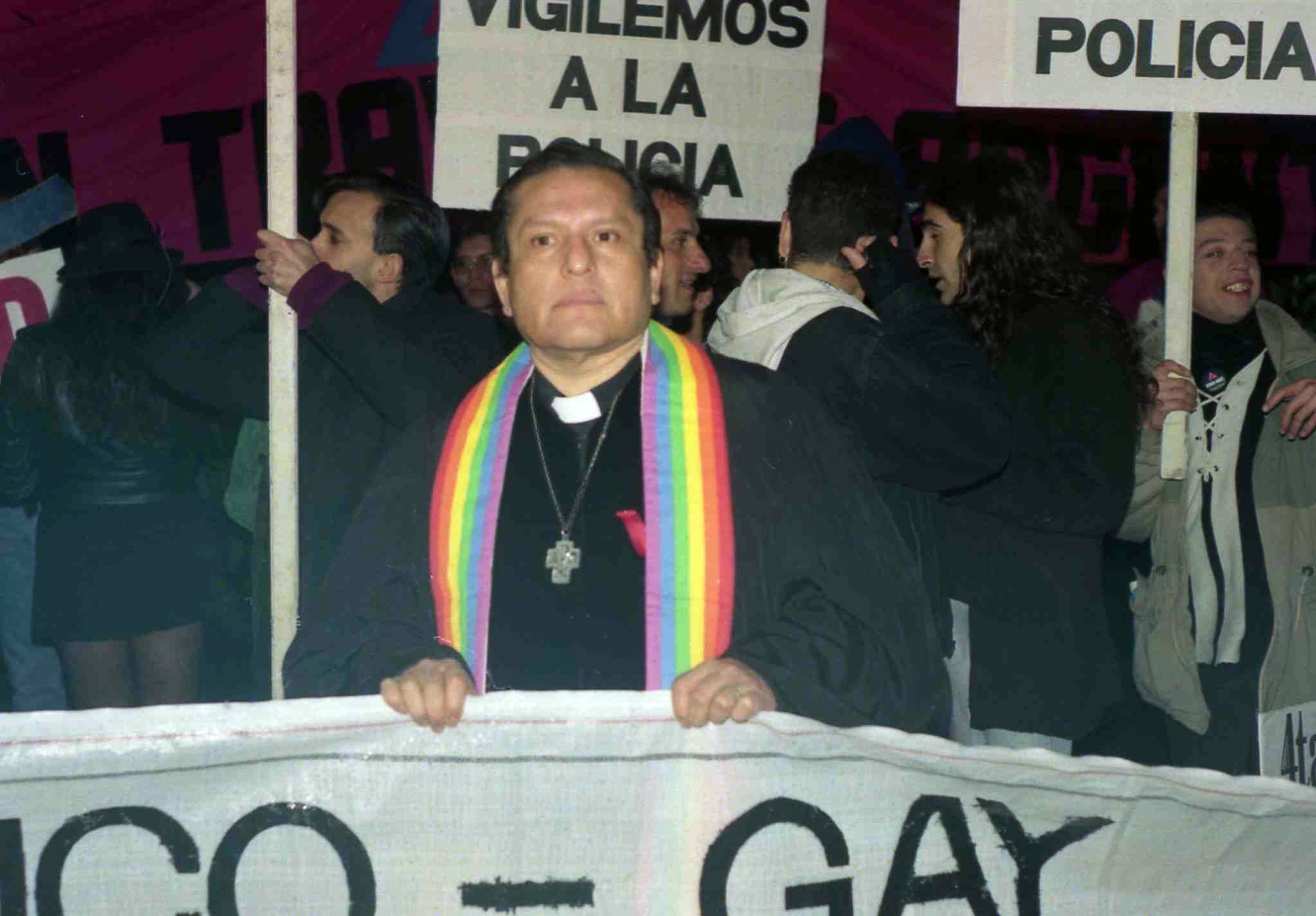 1995 Pride March
1995 Pride March
Roberto’s work for the rights of LGBT people did not stop with advocacy and protesting. He also worked in programs to distribute food to street people and the LGBT population living in risky Buenos Aires neighborhoods. In New York, Roberto was pastor of the Metropolitan Community Church “Cristo Rey,” from 1995 to 1997 and was head of the MCC program that assisted unhoused MCC members of the congregation. Between 1997 and his retirement in 2005, he was a pastor at Centro Cristiano de la Comunidad GLTTB, an MCC congregation.
Between that time and his retirement in 2005 In his later years, Roberto worked tirelessly to supporting and organizing LGBT people in marginalized áreas in the campaign for marriage equality and the Trans Identity Law, in which he obtained broad support from traditional and historical churches. He preached at MCC that met at Flores Methodist Church in Argentina.
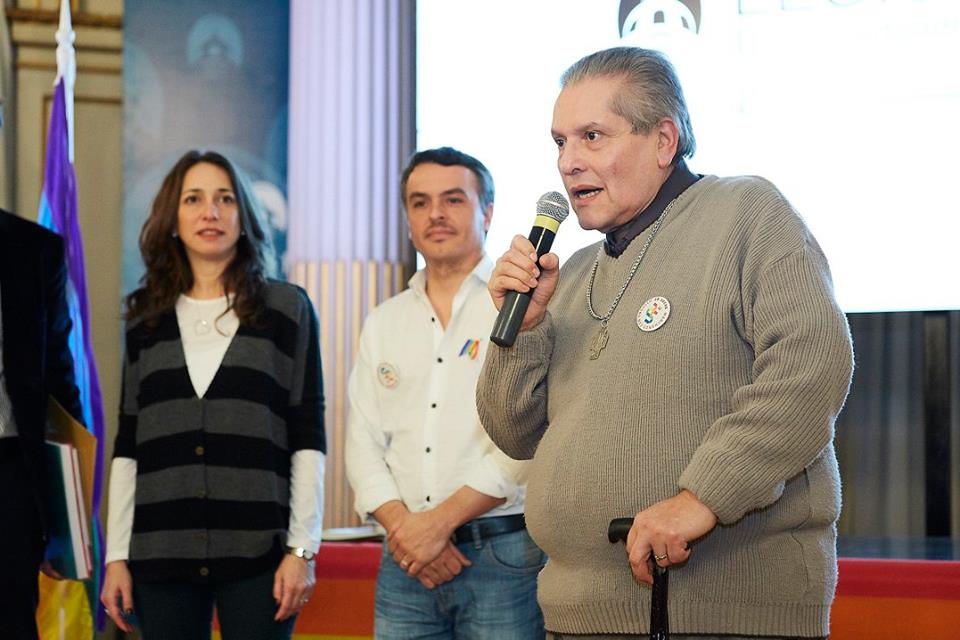 2016 Honor for 25 Years of Service
2016 Honor for 25 Years of Service
Following a lengthy illness and hospitalization, González died on April 8, 2024, at the age of 78. His MCC obituary stated that “Roberto González’s life can be summarized as half a century of risking his life and giving up the comforts he could have had when he reached old age, to serve the LGBT community and defend human rights and social justice.”
(This biographical statement written my Mark Bowman & Morris Floyd from the sources below with additional information provided by Noberto D'Amico.)
Biography Date: October 2024
Additional Resources
Obituary
https://myemail-api.constantcontact.com/Obituary---Rev--Roberto-Gonz-lez.html?soid=1101747410130&aid=iAmhJ_8O8qE
Kittredge Cherry memoir
https://qspirit.net/roberto-gonzalez-lgbtq-argentina/
Pagina article
https://www.pagina12.com.ar/727915-adios-al-pator-gay-roberto-gonzalez-
Tags
MCC | Clergy Activist | International Human Rights | Althaus-Reid, Marcella | Doner, John | Buenos Aires | Argentina | González, Roberto
Citation
“Rev. Roberto González | Profile”, LGBTQ Religious Archives Network, accessed February 22, 2026, https://lgbtqreligiousarchives.org/profiles/roberto-gonzalez.
Remembrances